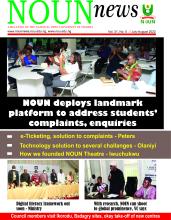
Lagos at night is a city with two faces. In the day, it is noisy, fast, and full of life. But at night, the streets change. Shops close, crowds scatter, and the yellow buses that rule the roads become fewer. People hurry home because everyone knows Lagos can be dangerous after dark.
Adaeze adjusted her cardigan as she stepped out of the University of Lagos library. She had lost track of time reading and working on her assignment. Her notebook was full of scribbles for the short story she wanted to finish, but now the campus was almost empty. She needed to get home fast.
By the time she reached Yaba bus stop, her heart sank. Only one bus was left. The conductor leaned out, slapping the side of the vehicle.
‘Ojota! Ojota straight! Last bus, o! Enter with your change!. I no send o!
Adaeze sighed with relief and rushed in. The bus was almost empty. She counted five other passengers. An old man in a loose agbada sat near her, a leather bag balanced on his lap, eyes calm but alert. Two young men whispered to each other in the middle row, their eyes sharp and restless, scanning everything like hawkers. At the back, a woman hummed softly to herself, rocking slightly. And then, another passenger slouched fully in his seat, head tilted back, eyes closing, ready to fall asleep as soon as the bus started moving. The conductor, loud as usual, jumped in and shut the door finally.
‘Driver, move am quick! Na last chance be this! he shouted. He was reeking of alcohol and igbo (a local name for marijuana).
The bus pulled out, leaving Yaba behind. At first, everything seemed normal. They passed Tejuosho, then Ojuelegba, where traffic was lighter than in the daytime. Adaeze leaned on the window, watching the faint glow of streetlights.
But after Ojuelegba, the driver turned onto a narrow street. Adaeze frowned. She knew this was not the usual route to Ojota. The road was darker, with fewer cars and no shops still open.
One of the young men spoke sharply. 'Driver, where you dey carry us go? This no be Ojota road na'
The conductor hissed. 'Calm down, abeg. Na short cut. We go reach faster sharparly.'
The passengers exchanged uneasy looks. The humming woman stopped her tune. The bus grew quiet except for the engine.
Adaeze noticed the old man beside her staring at her notebook. She shifted it closer to herself, but he smiled faintly.
'What do you write in there?' he asked.
Adaeze forced a smile. 'Just schoolwork.'
'Stories,' he said quietly. 'Good. But remember, every story needs an ending.'
His words unsettled her. She pressed her notebook tightly against her chest. This man was so strange, she thought.
The bus drove deeper into unfamiliar streets as houses thinned out. Streetlights flickered weakly, and in some places, there was only darkness. The road was so quiet that even the sound of the tires seemed too loud.
Suddenly, the bus stopped. The engine went dead. A heavy silence fell.
Then the lights inside the bus went out.
Ogheneme! Someone gasped. A chair creaked. In the darkness, Adaeze’s skin prickled. She could hear her own heart pounding, fast and uneven like Mama Ngozi's mortar at home.
When the lights flickered back on, one seat was empty. A passenger had disappeared. Adaeze’s eyes widened. Her notebook was also gone. She looked around in panic.
The old man sat calmly, his leather bag still on his lap. Slowly, he reached out and held up the notebook.
'I only borrowed it,' he said, smiling in a way that made Adaeze’s stomach twist. 'To remind you, every story must have an ending.'
Adaeze stared at him, unable to speak. Before anyone could react, the missing passenger reappeared in the corner seat. He sat stiffly, his eyes fixed on nothing, as if nothing had happened.
No one asked questions. The silence was too heavy.
The driver restarted the bus. This time, it turned back onto the familiar road. They passed Barracks, then Anthony, then Maryland. The noise of Lagos returned bit by bit with horns blaring, hawkers calling, and streetlights shining brighter.
Finally, they reached Ojota. The conductor shouted the stop, but his voice sounded tired. 'Everyone bó le o' he said in a mixture of English and Yoruba. Lagos conductors are known to be audacious and crazy like this. Adaeze didn't bother. She stood quickly, almost stumbling as she stepped out. The busy chaos of Ojota felt strangely safe after the strange silence of that bus some minutes ago.
At home, she locked the door and sat on her bed, her hands shaking as she opened her notebook.
The pages were the same, her messy handwriting, half-formed sentences, rough ideas for her assignment. But when she turned to the last page, she froze.
It wasn’t just one line. The entire story of her journey on the bus had been written out word for word: the strange detour, the blackout, the missing passenger, the old man returning her notebook. It was all there, exactly as it had happened.
But at the very end, one last sentence chilled her to the bone:
'She never made it home.'
Adaeze dropped the notebook, her breath caught in her throat. She looked around her room, suddenly unsure if she was truly there.
Victory Chioma Sam-Ebe
NOU231180908
Department of English
Faculty of Arts
- Log in to post comments
- 171 views





















